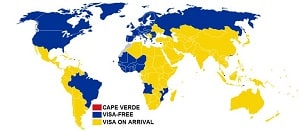When traveling to Cape Verde

It is essential to be aware of safety considerations to ensure a pleasant and secure trip. Here's a detailed overview of safety tips and advice for travelers:
General Safety And Crime
Petty Theft: Petty crime, such as pickpocketing and bag snatching, can occur, especially in crowded areas and tourist spots. Always keep your belongings secure and be vigilant in busy places.
Scams: Be cautious of common travel scams and avoid accepting unsolicited assistance.
Health and Medical Care
Healthcare Facilities: Medical facilities in Cape Verde are limited, especially on the smaller islands. Ensure you have adequate travel health insurance, and consider purchasing insurance that includes medical evacuation.
Vaccinations: No mandatory vaccinations are required for entry, but it’s recommended to be up-to-date on routine vaccinations. A yellow fever vaccination is required if traveling from a yellow fever-endemic country.
Water and Food Safety: Drink bottled or boiled water and avoid ice cubes. Stick to well-cooked food and eat at reputable restaurants to avoid foodborne illnesses.
Natural Hazards
Sun Exposure: The sun can be intense, so use high SPF sunscreen, wear hats, and stay hydrated.
Swimming: Be cautious of strong currents and tides, particularly on remote beaches without lifeguards. Always follow local advice and warning signs.
Transportation Safety
Road Conditions: Roads can be poorly maintained, especially in rural areas. Drive cautiously and be aware of pedestrians and animals on the road.
Taxis and Aluguers: Use licensed taxis and agree on the fare before the journey. Aluguers (shared minibusses) are commonly used but can be overcrowded and poorly maintained.
Safety in Specific Locations And Sal Island
Tourist Areas: Sal is generally safe, but exercise caution in crowded tourist areas like Santa Maria. Avoid isolated beaches at night.
Water Activities: Ensure you use reputable companies for water sports and follow safety guidelines.
Boa Vista Island
Remote Areas: Boa Vista is generally safe, but be cautious in remote areas and avoid walking alone at night.
Beach Safety: Pay attention to warnings about strong currents and tides. Santiago Island
Praia: The capital city, Praia, has areas with higher crime rates. Stick to well-populated and well-lit areas, especially at night.
Cidade Velha: While generally safe, take standard precautions with your belongings.
São Vicente Island
Mindelo: Mindelo is relatively safe, but remain vigilant in crowded areas and avoid walking alone at night in less populated areas.
Cape Verde Emergency Contacts
Cape Verde Police: Dial 132 for emergencies.
Cape Verde Fire Service: Dial 131.
Cape Verde Medical Emergency: Dial 130.
Cape Verde Embassy or Consulate: Know the contact details of your country’s embassy or consulate in Cape Verde.
Additional Safety Tips
Cape Verde Respect Local Customs: Dress modestly and be respectful of local customs and traditions, especially in rural areas and religious sites.
Travel Insurance: Ensure you have comprehensive travel insurance that covers health, accidents, theft, and trip cancellations.
Cape Verde Travel Communication: Learn a few basic phrases in Portuguese or Creole. Having a local SIM card or an international roaming plan can help you stay connected.
Stay Informed: Keep informed about local news and weather updates, especially during the rainy season when travel can be disrupted.
Cape Verde Travel Conclusion
Cape Verde is generally a safe destination for travelers, but like any travel destination, it is essential to take precautions to ensure your safety. By staying informed, being aware of your surroundings, and taking standard safety measures, you can enjoy a safe and memorable trip to this beautiful archipelago.





 |
|  |
|  |
|  |
| 